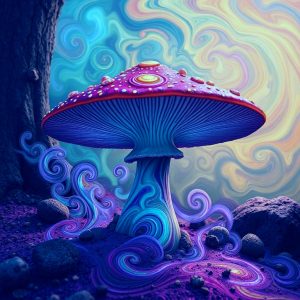When Psychedelics Reopen Wounds: Trauma, Memory, and the Limits of Set and Setting

A recent preprint study from less than 2 weeks ago (Simon et al., 2025) shook something in me. As a trauma-informed clinician, I’m well aware of both the promise and perils of psychedelic therapy. But this study—The Experience of Recalled Trauma During Psychedelic Experiences and Perceived Links to Subsequent Extended Difficulties—was unsettling.
Researchers surveyed over 600 people who experienced psychological distress long after their psychedelic trips ended. More than 40% traced their suffering to resurgent childhood trauma. These weren’t just “bad trips.” They were psychological earthquakes with aftershocks that lasted for months.
Through interviews with 18 participants, the data became heartbreakingly human.
One person recalled ayahuasca delivering a sudden, devastating revelation:
“It was like—your father sexually abused you. It put my entire life in context.”
Another spoke of terrifying somatic flashbacks:
“It really replicated the trauma. I barely survived it—and now I’m back.”
Some doubted the memories’ accuracy but still suffered from the lack of closure. Others experienced lasting insomnia and flashbacks.
The Numbers Tell a Story
- 39% described direct trauma re-experiencing.
- 22% had symbolic or bodily echoes of trauma.
- 50% reported confusion or fragmentation.
- Only half found eventual meaning or healing.
- Nearly a quarter (22%) felt retraumatized—worse off than before.
The Insufficiency of “Set and Setting”
Psychedelic culture leans heavily on the caveat of “set and setting”—the idea that mindset and environment shape the experience. And to some extent, they do. But this study reveals their limits. Trauma, by nature, defies curation. Even in structured, well-supported settings, it can overwhelm.
What’s Happening in the Brain?
Psychedelics work by quieting the Default Mode Network—the brain’s stabilizing sense of self. With that filter gone, buried trauma can surge into awareness. This can help or harm, depending on how it happens. There’s also the matter of memory reconsolidation. When memories are recalled, they can be “re-stored” differently. In safe, therapeutic environments, they may return with less fear. But in chaotic or overwhelming conditions, memories may reconsolidate with even more fear. Add the ingredient of neuroplasticity—the brain’s heightened openness during a psychedelic trip—and you have a volatile mix. The very window that makes psychedelics powerful can also make them dangerous. It’s like pouring cement during an earthquake: you risk setting the cracks in stone.
Trauma Therapy: A Slower, Safer Path
Established trauma therapies approach memory with caution:
- EMDR uses bilateral stimulation to revisit trauma while keeping the client grounded.
- Somatic Experiencing works in small doses—“titration”—to avoid overwhelm.
- Internal Family Systems (IFS) helps clients relate to inner parts without becoming engulfed.
- Havening Techniques use soothing touch to generate calming brainwaves during memory recall.
These therapies share a core principle: containment. They don’t pry trauma open; they coax it gently into the light, giving the nervous system time to metabolize the pain.
Psychedelics, by contrast, often rip the doors off.
The Amplifier Paradox
Psychedelics amplify. That’s their power—and their danger. They can bring suppressed material to the surface, but amplification is not the same as healing. One person may find liberation; another may be shattered. Trauma therapy is like tending a fire: you feed it slowly, so it warms without burning. Psychedelics? Sometimes it’s like dousing the fire in gasoline. Sometimes brilliance. Sometimes devastation. “Psychedelics amplify. But amplification isn’t healing—it can illuminate, or it can devastate.”
A Cautionary Hope
The message of this study is clear: psychedelics are not inherently therapeutic. They are tools. Powerful ones. But especially for trauma survivors, they must be wielded with the wisdom of existing trauma modalities—pacing, containment, grounding. Trauma doesn’t yield to force. It yields to care. Until protocols reflect this, psychedelics will remain a double-edged sword—part medicine, part minefield.
Read a more detailed article on SUBSTACK HERE
We love hearing from you, please feel free to leave your comments below.
With Gratitude,
Rus Devorah
You Can Still Help Our Kickstarter Campaign
Our Kickstarter is entering it’s final weeks! Your support can helps us finish the album, create lesson booklets, and share these songs far and wide. Even a small pledge or a share helps plant seeds that will grow into something beautiful.
Let’s give our kids music that helps them grow strong, joyful, and unshakable.
Click HERE to join our Kickstarter campaign NOW and be part of something joyful and lasting.


